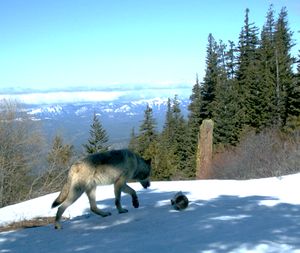Wolf bills debated in Washington Legislature
ENDANGERED SPECIES -- House and Senate committees in the 2015 Washington Legislature considered bills Wednesday to deal with the issue of livestock-killing wolves in eastern Washington, according to a report by Jacob Rummel of Washington State University's Murrow News Service
The bills are aimed at speeding up the distribution of wolves in the state so they can be declared "recovered" and "delisted" from state endangered species protections.
Reports Rummel:
The wolf conservation and management plan adopted in 2011 by the Department of Fish and Wildlife requires three regions of the state to host at least four breeding pairs of wolves each. The eastern Washington region reached this goal before the other two regions.
"The distribution has not gone, I think, as the plan expected," said Rep. Joel Kretz, R-Wauconda, the primary sponsor of a bill that amends the Department of Fish and Wildlife’s plan for wolf recovery. "We’ve got a huge number in one area of the state and they’re not dispersing as quickly as we hoped."
Under federal law, gray wolves are considered an endangered species in the western two-thirds of the state, but not in the eastern third. State law classifies gray wolves as endangered throughout the entire state.
Rep. Joe Schmick, R-Colfax, said he has one constituent producer that lost 300 sheep to wolves. Sen. Judy Warnick, R-Moses Lake, said the wolf population is starting to become a problem in Kittitas County as well."The support for wolves is by and large on this (west) side of the mountains, where there are no wolves," Warnick said.
The House Agriculture and Natural Resources Committee and the Senate Natural Resource and Parks Committee both heard public testimony on Wednesday for bills that address the wolf population difficulties.
Opponents of the bills said it’s not yet the time to amend the Department of Fish and Wildlife’s plan because it would unnecessarily disrupt the restoration of wolves in the state.
"What would be appropriate is some sort of funding for effective conflict avoidance measures that can keep wolves and livestock safe while this process moves forward," said Elizabeth Ruther, the Northwest representative for Defenders of Wildlife.
Kretz’s bill would alter the Department of Fish and Wildlife’s plan by changing the metric of success from the number of wolf breeding pairs to the number of wolf packs, but opponents of the bill said this metric is not accurate enough.
"After recovery I agree that tracking of breeding pairs will not be necessary," said Diane Gallegos, the executive director for Wolf Haven International.
Another bill considered in the Senate Natural Resource and Parks Committee would allow the Department of Fish and Wildlife to take lethal action against wolves in specific instances after non-lethal prevention methods have been tried and failed. Warnick is a co-sponsor on this bill.
"Wolves, like other predatory animals, become acclimated and they will go after the least resistant food source," Warnick said. "So, when they discover livestock we need to try to discourage them."

